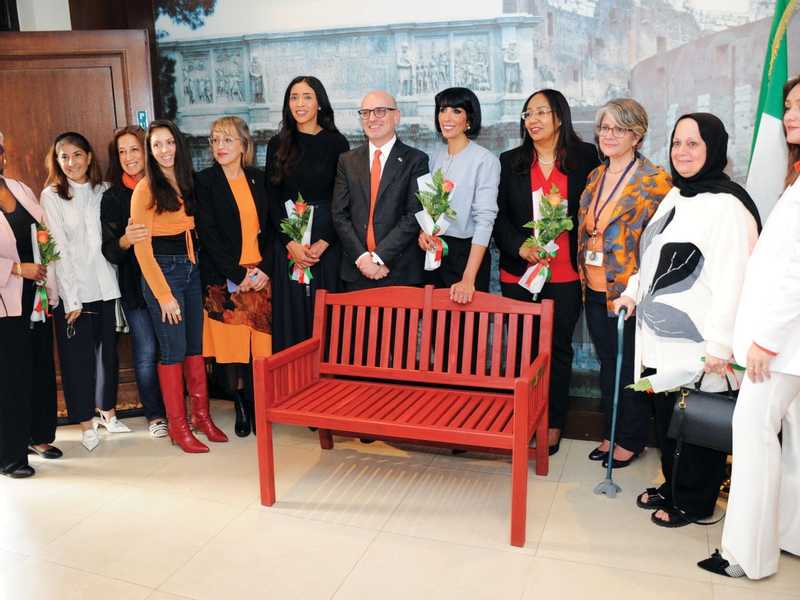Italian Embassy unveils ‘Red Bench’ initiative against gender violence
A group of activists praised Kuwait’s efforts in advancing women’s rights while calling for stronger awareness initiatives, emphasizing that violence against women is a global issue rooted in cultural misconceptions.

• His Excellency Lorenzo Morini, the Italian Ambassador to the State of Kuwait, emphasized the importance of collective efforts to end violence against women, stating that the initiative aims to raise awareness and foster commitment to combating all forms of violence against women.
A group of activists, including women’s rights advocates, emphasized the need for unified efforts to combat violence against women. They praised Kuwait’s role in promoting women’s rights and empowerment and called for enhanced awareness initiatives, according to Al Qabasnewspaper.
This took place during the launch of the ‘Red Bench’initiative, organized by the Italian Embassy in collaboration with the “United Nations’ 16 Days of Activism” campaign against gender-based violence, held at the embassy.
Combating all forms of violence against women
His Excellency Lorenzo Morini, the Italian Ambassador to the State of Kuwait, emphasized the importance of collective efforts to end violence against women, stating that the initiative aims to raise awareness and foster commitment to combating all forms of violence against women.
Ambassador Morini noted that the ‘Red Bench’ initiative originated in Italy ten years ago. It involves placing red benches in public spaces such as parks, buildings, and ministries to symbolize the anguish endured by women due to violence, with the red color representing blood.
He underscored that addressing violence against women is a crucial issue requiring genuine and collaborative efforts. He also highlighted that a red bench was brought from France to Kuwait “to send a message to countries worldwide to end violence against women.”
He noted that “awareness of women’s rights in Kuwait and efforts to combat violence against them are growing. However, we must unite to enhance these efforts globally.” He emphasized that violence against women is not confined to Kuwait or Italy but stems from cultural issues and certain misconceptions.
Tackling violence against women with stronger laws and greater awareness
Ambassador Ghada Al-Taher, the United Nations Secretary-General’s representative and resident coordinator in Kuwait, explained that “laws exist to protect women from violence.” However, she pointed out that “the issue lies not in the laws themselves but in their implementation and in ensuring individuals understand that violence against women is neither trivial nor a display of masculinity.”
Regarding her assessment of women’s protection centers in Kuwait, Al-Taher stated, “We held meetings with the Assistant Foreign Minister for Human Rights Office Affairs, Sheikha Jawaher Al-Daij, who affirmed her rejection of violence against women and emphasized the need to protect women, particularly victims of abuse.” She also highlighted the presence of several centers in Kuwait dedicated to supporting abused women.
Al-Taher added that two-thirds of women globally experience violence, noting that the challenges are exacerbated in conflict regions. She stressed that “every 10 minutes, a woman becomes a victim of violence somewhere in the world.”
Ending violence against women starts with changing culture through education
Balsam Al-Ayoub, a member of the Kuwait Club Board of Directors and founder of the “Be Strong” sports development project for women, shared her perspective as an athlete.
She emphasized the importance of women being strong and self-reliant. Al-Ayoub stated that violence against women is a cultural issue that must be addressed through proper upbringing and education.
In turn, human rights activist Sundus Hamza, a member of the “Altruism” campaign and the “Abolish Article 153” campaign against honor killings, emphasized the importance of supporting women’s rights and causes.
Three pillars for change to ending violence on women
- Enforcing laws to prevent violence against women.
- Changing societal attitudes that enable such violence.
- Promoting gender equality and women’s empowerment.












